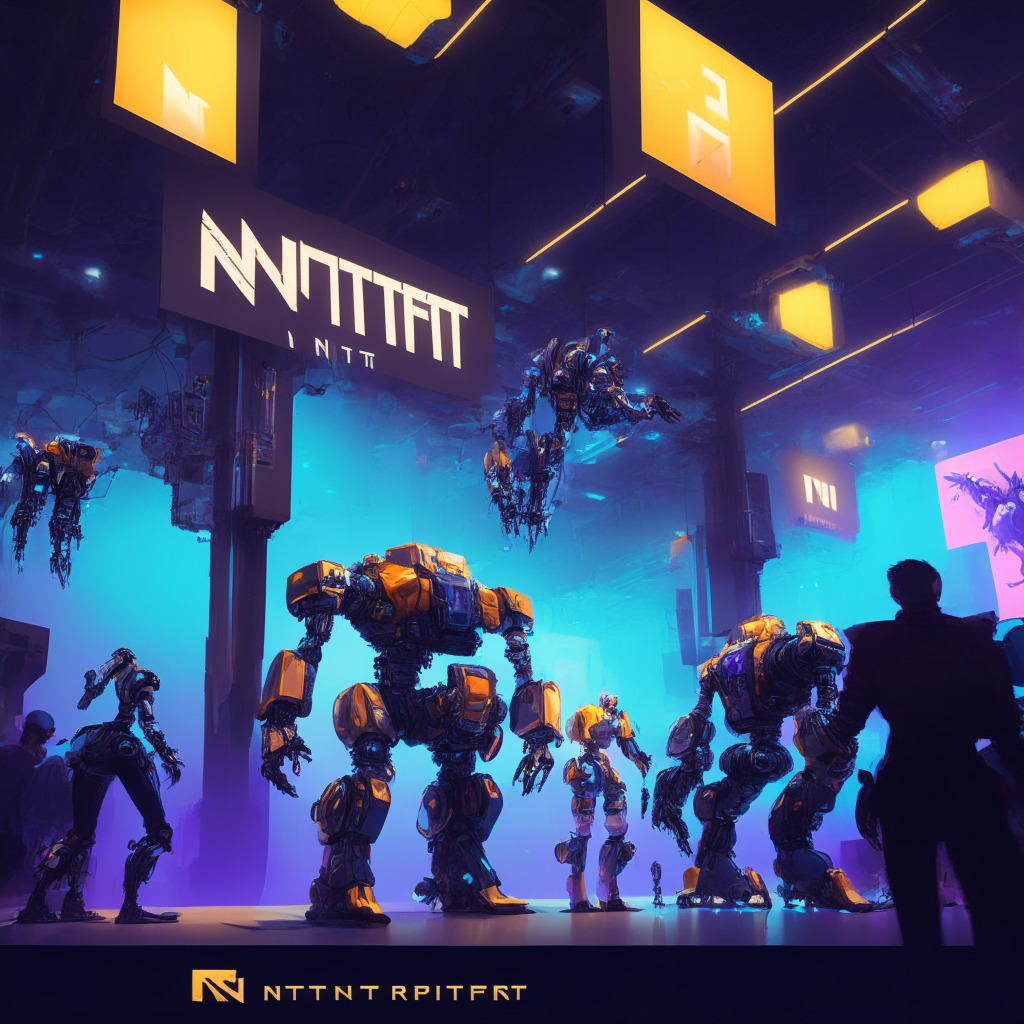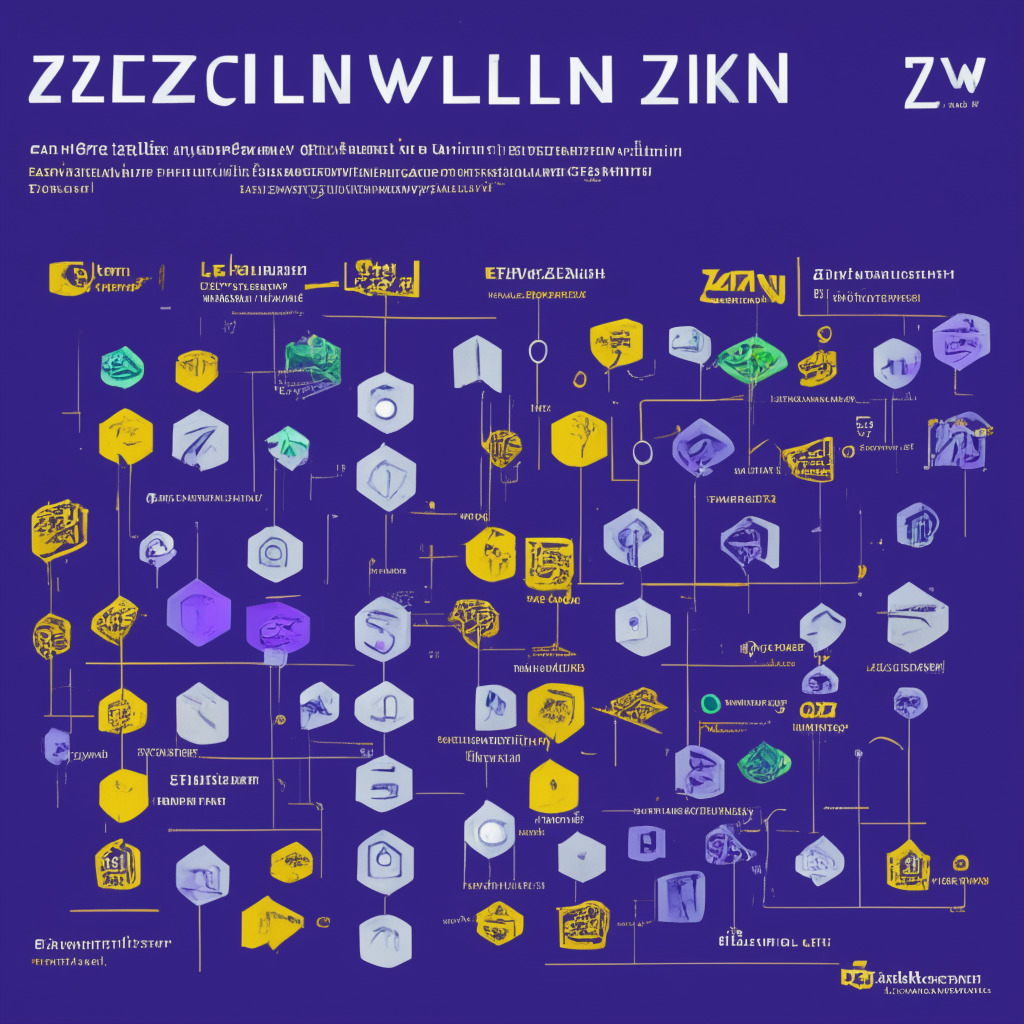Yuga Labs announces HV-MTL Forge, a workshop-building game centered around Bored Ape Yacht Club’s robot NFTs, set to launch on June 29. Owners of Sewer Pass NFTs can access the Forge game, where they customize workshops to secure community votes. The game builds upon the success of Yuga Labs’ controversial Dookey Dash, which generated $110 million in NFT trades.
Day: June 20, 2023
Ava Labs Integrates AvaGPT to Enhance User Support: Innovation Meets AI Limitations
Ava Labs introduces AvaGPT, employing OpenAI’s ChatGPT technology to provide quick assistance to Avalanche users while ensuring complex queries are handled by their customer support. Through a partnership with Kapa AI, AvaGPT becomes an integral part of Ava Labs Core platform. However, Ava Labs acknowledges AI limitations and maintains transparency on the accuracy of chatbot information.
Bitcoin’s Surge and BlackRock’s ETF: Temporary Boost or Enduring Growth?
Bitcoin surged past $28,000, attributed to BlackRock’s announcement of a new Bitcoin ETF, revitalizing the crypto market. Despite recent regulatory challenges, this development offers hope but also highlights the importance of monitoring trends and maintaining cautious optimism within the industry.
Flashbots Personnel Shake-Up Amid $1 Billion Valuation: Debating the Future of MEV & Blockchain
Crypto research and development firm Flashbots experiences major personnel changes amid raising funds at a $1 billion valuation. The company, known for its MEV-Boost middleware, faces challenges and aims to develop the SUAVE network, offering more accessible MEV extraction features to other blockchains.
Alibaba’s Crypto-Friendly Leadership Change: Boon or Bane for the Blockchain Industry?
Alibaba’s appointment of Joe Tsai, a known crypto enthusiast, as the company chair suggests potential increase in crypto-friendly endeavors. However, with China’s ambivalent relationship with blockchain and crypto, Tsai’s leadership may also put the company in a challenging position.
Bridging Bitcoin and Metaverse: Exploring the Potential of Bitmap Theory
Bitmap Theory, a groundbreaking concept bridging the gap between Bitcoin and the metaverse, enables ownership claims over Bitcoin blocks and integrates them into the metaverse. This open-source standard offers new opportunities for community-driven 3D spaces, facing both potential benefits and challenges for blockchain integration and user privacy.
Slim Jim’s Meataverse NFTs: Pros, Cons, and the Future of Web3 in Mainstream Business
Slim Jim enters the Web3 space with its interactive “Meataverse,” offering free GigaJim NFTs to fans through the Ethereum scaling network, Polygon. This initiative highlights the potential impact of emerging blockchain technology on businesses across various industries.
Iris Energy’s Hash Rate Expansion: Investing in Data Centers and Venturing into AI
NASDAQ-listed Bitcoin mining firm Iris Energy aims to increase its hash rate capacity by 63% to 9.1 EH/s by early 2024, utilizing its 80MW data center in Texas. The company’s shares surged 21% following the announcement, reflecting a growing interest in the blockchain industry. Iris Energy also explores opportunities in energy-intensive compute applications such as AI.
AI Crackdown on Chicken or Egg Debate: Boon or Bane for Philosophical Discourse?
AI, like ChatGPT, tackles the chicken-or-egg conundrum with a concise “Egg,” aligning with scientific consensus. While AI’s potential to simplify and inform on philosophical debates is remarkable, it’s crucial to maintain human critical thinking and discourse for comprehensive understanding.
Polygon PoS Upgrade to zkEVM Validium: Security vs Scalability vs Decentralization Debate
Polygon co-founder Mihailo Bjelic proposes an upgrade to the Polygon PoS network, suggesting a shift to a “zkEVM validium” version for increased security through zero-knowledge proofs. This upgrade would enable Polygon zkEVM for high-value transactions, offering lower fees and enhanced security from Ethereum’s features, targeting applications like Web3 gaming and social media.
EDX Markets: A Game Changer for Crypto, Traditional Finance Giants Enter the Fray
EDX Markets, a digital asset market backed by Fidelity Digital Assets, Charles Schwab, and Citadel Securities, aims to bring competition, transparency, fairness, and safety to the crypto space. Unlike other exchanges, EDX Markets doesn’t custody customer assets and requires users to rely on financial intermediaries, appealing to regulators.
Wall Street Giants Back EDX Markets: A New Era for Crypto Exchanges and Regulations
The newly launched cryptocurrency exchange, EDX Markets, backed by Wall Street giants Charles Schwab, Citadel Securities, and Fidelity Digital Assets, aims to fuse traditional finance with cryptocurrency while emphasizing compliance. The venture represents a significant milestone in addressing regulatory concerns and encouraging adoption within the traditional financial industry.
US Political Divide on Crypto Regulations: How it Affects Investors and Companies
Without bipartisan support for digital asset-focused legislation, investors and companies may turn to crypto-friendly jurisdictions, warns Moody’s. Key differences include stablecoin regulation and consumer protection, with many crypto firms already exploring options outside the US.
68 Blockchain Tokens Classified as Securities: Implications for Users and Exchanges
The SEC has identified 68 blockchain tokens, including Solana’s SOL and Cardano’s ADA, as securities, affecting over $100 billion assets. The classification raises questions on users’ access and potential regulatory constraints on centralized exchanges, while highlighting the challenge in balancing regulations and blockchain technology’s open nature.
Binance Embraces Bitcoin Lightning Network: Scalability vs Centralization Risks
Binance is operating nodes on the Bitcoin Lightning Network to address network congestion and improve transaction speed. The integration aims to make Bitcoin transactions more efficient, but faces challenges, including centralization concerns. Meanwhile, Binance navigates a legal battle with the SEC.
Exploring Polygon PoS Upgrade to zkEVM Validium: Scalability, Security, and Future Prospects
The Polygon Labs engineering team proposed an upgrade to Polygon Proof-of-Stake (PoS) sidechain, transitioning to ‘zkEVM Validium,’ an Ethereum-secured Layer 2 network secured by zero-knowledge proofs. Targeted for Q1 2024, this upgrade aligns with Polygon 2.0’s vision and aims to enhance scalability, security, and interoperability within the broader cryptocurrency ecosystem.
Bitcoin’s $28k Surge and the Impact of Major Financial Institutions’ Crypto Initiatives
Bitcoin surged above $28,000 on Tuesday, marking the largest short squeeze this month as traders faced $36.6 million in liquidations. The surge coincided with major financial services institutions announcing crypto initiatives, including Deutsche Bank’s digital asset custody license application and BlackRock’s spot BTC ETF filing. These developments indicate increased exposure to digital assets in traditional finance.
Biden’s AI Summit: Balancing Innovation, Regulation, and Blockchain Implications
President Joe Biden is set to meet with AI experts to discuss the future of artificial intelligence and the need for legislation and guidelines. This comes at a time when the U.S. government has yet to establish a comprehensive strategy for AI development and cryptocurrency regulation, while Europe, China, and the United Kingdom have already made progress in these areas. The meeting aims to address concerns on policy, regulation, and balancing innovation with safety and risk mitigation.
Škoda Auto’s NFT Venture: Pros, Cons, and the Future of Automotive Industry in Web3 Era
Škoda Auto partners with Near Protocol to launch “Škodaverse India,” a Web3 and NFT experience with low gas fees, multiplatform interoperability, and eco-friendliness. This marks Škoda’s entry into the Web3 space, offering unique digital assets, potential value appreciation, and exclusive perks tied to NFT ownership, highlighting growing adoption of blockchain technology in various industries.
Bitcoin’s $27,000 Struggle: Analyzing the Inverted Hammer and Potential Sell Opportunities
Bitcoin faces a crucial resistance level at $27,000, with speculations of selling pressure increasing due to an inverted hammer candlestick pattern. Observing this level is vital, as it could determine Bitcoin’s future trajectory in the ever-evolving digital currency landscape.
Shiba Inu Price: Support at $0.0000055 – Path to Recovery or Continuation of Downtrend?
The Shiba Inu price experienced a massive sell-off but recovered half of the day’s losses from the $0.00000555 support level. With increasing uncertainty in the crypto market, the Shiba Inu price may undergo a sideways trend or consolidation period. Key indicators to watch include the MACD and EMAs.
Fortnite x Nike Collaboration: The Future of Blockchain, Crypto, and Gaming?
Fortnite recently announced a collaboration with Nike and its NFT-driven .Swoosh Web3 platform. The partnership, “Airphoria,” allows in-game Nike-branded experiences in Fortnite Creative Mode. Users can participate in a Nike sneakerhunt and earn a free in-game accessory.
Polygon’s ZK Technology Upgrade: Boon or Bane for Blockchain’s Future?
Polygon aims to make its primary chain compatible with zero knowledge (ZK) technology, potentially transforming it into a zkEVM validium and ensuring Ethereum Virtual Machine compatibility. This upgrade could enhance security, eliminate reorgs, expedite transactions, and scale the blockchain more effectively. However, the complex integration may introduce unforeseen challenges.
Regulatory Debates Shape Crypto’s Future: Institutional Adoption and Tokenization at Stake
A recent survey by crypto company Laser Digital revealed that 82% of respondents hold a positive view of the digital asset class, with optimism for Bitcoin and Ether performance. However, 90% prefer investment vehicles backed by large traditional financial institutions, highlighting the need for increased regulatory clarity and market experimentation for digital assets and traditional finance to coexist and benefit investors.
Uncovering the Binance Ltd Mystery: Shell Companies in the Crypto World – Legit or Not?
A recent finding revealed Binance Ltd and 2,400 other companies were registered under the same address in the UK. Binance clarified that Binance Ltd was not affiliated with their exchange. Shell companies are notorious for concealing ownership and illegal activities, but they also serve legitimate purposes like privacy protection, tax planning, and real estate investments.
SEC vs Coinbase: A Clash Over Crypto Regulation and the Future of Innovation
The SEC and Coinbase’s chief policy officer shared divergent perspectives on crypto regulation at a policy event, highlighting industry complexities. While the SEC focuses on addressing investor harm and stifling fraud, Coinbase raises skepticism around the federal government’s approach and their commitment to the crypto economy’s development.
MSc in Metaverse: Pioneering Education or Premature Investment in Emerging Tech?
The University of Nicosia (UNIC) introduces a Masters of Science in Metaverse degree, covering metaverse design and management, AR, VR, NFTs, blockchain, and more. While aiming to address the growing interest in metaverse technology, this ambitious program also sparks skepticism due to its nascent nature.
Digital Euro Debate: A Step Towards Efficiency or Privacy Threat?
The European Commission plans to publish legislation on a digital euro on June 28th, addressing privacy, distribution, and offline transactions. The central bank digital currency could potentially enhance consumer trust and streamline cross-border transactions, but skeptics raise privacy concerns and the threat to physical currency.
Bullish Outlook for Crypto Post-Winter: Pantera Capital’s Take on Market Recovery and Bitcoin ETFs
Pantera Capital’s founder, Dan Morehead, has a bullish outlook for the digital currency ecosystem following last year’s crypto winter. Encouraging indicators, like BlackRock’s Bitcoin ETF application, could contribute to a re-emerging optimism among crypto enthusiasts and investors.
Data Act’s Impact on Blockchain: EU’s Reassurance vs Industry Concerns
The European Commission addressed concerns about the Data Act’s impact on blockchain technology and smart contracts, claiming the law shouldn’t pose issues for smart contract software vendors. However, fears persist that the law’s scope could unintentionally extend further, affecting public permissionless networks and undermining the core of trustless transaction environments.
Web3 vs Web2 Social Media: Can Crypto-Enhanced Platforms Finally Triumph?
Web3 social media platforms struggle to disrupt legacy Web2 platforms like Facebook and Twitter. Despite their potential to offer economic motivators, Web3 platforms face challenges in reaching a critical mass of users and maintaining genuine engagement. Innovative methods for content delivery, curation, and engagement will be crucial for these platforms to succeed.
Crypto Exchanges’ Struggles: Regulators Impact Binance US and Coinbase Market Share
Recent research reveals that Binance US’s market share has dropped significantly since the start of the year, falling from 8% to 1.5%. This reduction is attributed to the high-profile lawsuits against both Binance and its US affiliate, BAM Trading, by the SEC. The unfolding legal drama highlights the challenges faced by cryptocurrency exchanges in an increasingly regulated market.































